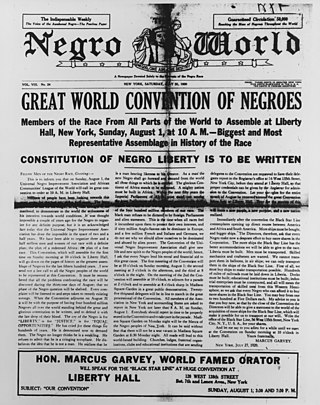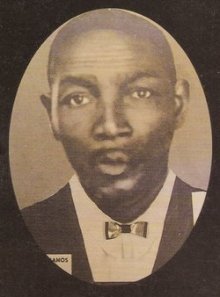Related Research Articles

Marcus Mosiah Garvey Jr. was a Jamaican political activist. He was the founder and first President-General of the Universal Negro Improvement Association and African Communities League, through which he declared himself Provisional President of Africa. Ideologically a black nationalist and Pan-Africanist, his ideas came to be known as Garveyism.

"Land of the Free" is the national anthem of Belize. The words were written by Samuel Alfred Haynes in 1929 based upon Haynes poem “Land of the Gods.” The musical arrangement for “Land of the Gods,” was composed with Selwyn Walford Young in 1930. “Land of the Gods” was changed to “Land of the Free” by the George Cadle Price administration, officially adopted as the National Anthem of Belize in 1981.

The Pan-African flag is a tri-color flag consisting of three equal horizontal bands of red, black, and green. The Universal Negro Improvement Association and African Communities League (UNIA-ACL) formally adopted it on August 13, 1920, in Article 39 of the Declaration of the Rights of the Negro Peoples of the World, during its month-long convention at Madison Square Garden in New York City. Variations of the flag can and have been used in various countries and territories in the Americas to represent Garveyist ideologies.

The Universal Negro Improvement Association and African Communities League (UNIA-ACL) is a black nationalist fraternal organization founded by Marcus Garvey, a Jamaican immigrant to the United States, and his then-wife Amy Ashwood Garvey. The Pan-African organization enjoyed its greatest strength in the 1920s, and was influential prior to Garvey's deportation to Jamaica in 1927. After that its prestige and influence declined, but it had a strong influence on African-American history and development. The UNIA was said to be "unquestionably, the most influential anticolonial organization in Jamaica prior to 1938," according to Honor Ford-Smith.

Negro World was the newspaper of the Marcus Garvey's Universal Negro Improvement Association and African Communities League (UNIA). Founded by Garvey and Amy Ashwood Garvey, the newspaper was published weekly in Harlem, and distributed internationally to the UNIA's chapters in more than forty countries. Distributed weekly, at its peak, the Negro World reached a circulation of 200,000.

Henrietta Vinton Davis was an elocutionist, dramatist, and impersonator. In addition to being "the premier actress of all nineteenth-century black performers on the dramatic stage", Davis was proclaimed by Marcus Garvey to be the "greatest woman of the Negro race today".
Afro-Caribbean people or African Caribbean are Caribbean people who trace their full or partial ancestry to Africa. The majority of the modern Afro-Caribbean people descend from the Africans taken as slaves to colonial Caribbean via the trans-Atlantic slave trade between the 15th and 19th centuries to work primarily on various sugar plantations and in domestic households. Other names for the ethnic group include Black Caribbean, Afro or Black West Indian or Afro or Black Antillean. The term Afro-Caribbean was not coined by Caribbean people themselves but was first used by European Americans in the late 1960s.
Selwyn Walford Young, usually known as Walford Young, was a Belizean musician and composer. Among his most famous compositions is the music to Belize's national anthem, "Land of the Free".

Marcus Garvey Park is a 20.16-acre (81,600 m2) park on the border between the Harlem and East Harlem neighborhoods of Manhattan, New York City. The park, centered on a massive and steep outcropping of schist, interrupts the flow of Fifth Avenue traffic, which is routed around the park via Mount Morris Park West. The park is also bounded by 120th Street to the south, 124th Street to the north, and Madison Avenue to the east.
James Wormley Jones was an African-American policeman and World War I veteran, who is best known for having been the first African-American Federal Bureau of Investigation special agent.

Emory J. Tolbert (1946-2022) was an American historian, educator, and activist. His scholarship centers on Marcus Garvey and Garveyism, as well as wider aspects of African American history.

Thomas Vincent Ramos, commonly known as T. V. Ramos, was a Belizean civil rights activist who promoted the interests of the Garifuna people, and is now considered a national hero.

Isaiah Emmanuel Morter was born in 1860 in the Freetown district of Belize. He was of Igbo descent coming from a line of slaves brought to America from Nigeria. Marcus Garvey wrote that "Morter grew up fighting the oppositions and difficulties generally surrounding one born to his condition, until he lifted himself to the highest pinnacle of service to his race and to his country."

Black Cross Nurses is an international organization of nurses which was founded in 1920, based upon the model of the Red Cross. The organization was the women's auxiliary of the Universal Negro Improvement Association and African Communities League and was established to provide health services and education to people of African descent.
Vivian Wilhelmina Myvett Seay (1881–1971) was a British Honduran nurse, social reformer and activist. Seay, Creole and of the middle class, attended the Anglican Church school and earned her teaching credentials in the pupil-teacher program. In 1920, she founded the country's Black Cross Nurses and led the group until she died, 51 years later. A social activist, the legalization of divorce in Belize is partially attributed to her work. In 1951, she was the only woman founder of the National Party and she was the country's second woman citizen to be honored as Member of the Order of the British Empire.
Robert A. Hill is a Jamaican historian and academic who moved to the United States in the 1970s. He is Professor Emeritus of History and Research Professor at the University of California, Los Angeles (UCLA), and Visiting Fellow at The Sir Arthur Lewis Institute of Social and Economic Studies (SALISES), University of the West Indies at Mona, Jamaica.

The Nationalist Movement seeking independence for Belize first arose in the 1930s and 1940s. Three groups played important roles in developing the movement. One group consisted of working-class individuals and emphasised labour issues. This group originated with Antonio Soberanis Gómez and the Labourers and Unemployed Association (LUA) between 1934 and 1937 and continued through the General Workers Union (GWU). The second group, a radical black nationalist movement, emerged during World War II. Its leaders came from the LUA and the local branch of Marcus Garvey's Universal Negro Improvement Association (UNIA). This group called itself variously the British Honduras Independent Labour Party, the People's Republican Party, and the People's National Committee. The third group consisted of people such as the Christian Social Action Group (CSAG) who engaged in electoral politics within the narrow limits defined by the constitution. From the 1950s onwards the nationalist movement came to be dominated by the People's United Party which led the country to independence in 1981.

Maymie de Mena was an American-born activist who became one of the highest-ranking officers in the Universal Negro Improvement Association (UNIA). She has been credited with keeping the organization alive after Marcus Garvey's conviction for mail fraud and deportation from the United States.
The Daily Negro Times was a short-lived African American newspaper published in New York City by Marcus Garvey in 1922. Garvey bought a second hand newspaper press on which to print the paper and equipped the editorial office with a United Press ticker tape, probably the first African American newspaper to have such a facility.
Hucheshwar Gurusidha Mudgal was an Indian political activist who became prominent in Marcus Garvey's Universal Negro Improvement Association working on the Daily Negro Times and Negro World. Born in India, he arrived in New York City in 1920, where he stayed for seventeen years.
References
- ↑ Macpherson, Anne S. (2007). From Colony to Nation: Women Activists and the Gendering of Politics in Belize, 1912-1982 . University of Nebraska Press. p. 84. ISBN 9780803232426. ISSN 1555-8401.
- ↑ Thomas Streissguth (1 August 2009). Belize in Pictures . Twenty-First Century Books. p. 69. ISBN 978-1-57505-958-7 . Retrieved 30 April 2013.
- ↑ Winston James (1998). Holding Aloft the Banner of Ethiopia: Caribbean Radicalism in Early Twentieth-century America. Verso. p. 67. ISBN 978-1-85984-140-2 . Retrieved 30 April 2013.
- ↑ Hill, Robert A., ed. (1983). The Marcus Garvey and Universal Negro Improvement Association Papers. Vol. VII. University of California Press. p. xxxvii. ISBN 9780520072084.